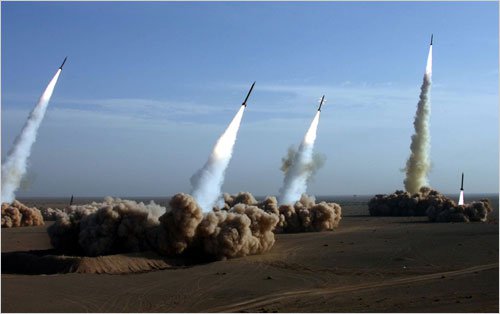
President Trump’s stern warning after an Iranian ballistic missile test that the country has been “put on notice” risks drawing the United States into a conflict or making Trump look weak if it doesn’t follow through with some retaliation should Iran take another provocative action, foreign policy analysts said.
Even those experts who welcome a robust response to a country many in the Trump administration view as one of the most dangerous threats cautioned that the new president needs options ready to respond if Iran tests his resolve.
“If you’re going to make a threat, you need to be prepared to carry through with it,” said Fred Kagan, an analyst with the American Enterprise Institute. “The question is: Are they prepared to do carry through with it.”
Trump’s national security adviser, Michael Flynn, said Wednesday that the United States was “officially putting Iran on notice” after Iran launched a ballistic missile on Sunday and an Iranian-backed militia in Yemen attacked a Saudi naval vessel.
Trump repeated the warning Thursday in a tweet: “Iran has been formally PUT ON NOTICE for firing a ballistic missile. Should have been thankful for the terrible deal the U.S. made with them!”
Trump was referring to the deal Iran reached with the Obama administration and five other world powers to curb its nuclear program in return for the lifting of many international sanctions and return of funds long frozen by the U.S. and other countries.
“Iran was on its last legs and ready to collapse until the U.S. came along and gave it a life-line in the form of the Iran Deal: $150 billion,” Trump tweeted Thursday.
Iran said the test launch is not a violation of the nuclear deal because the missile was not designed to carry a nuclear warhead. Ali Akbar Velayati, who advises Ayatollah Ali Khamenei, Iran’s supreme leader, dismissed Flynn’s statement, saying threatening Iran was “useless.”
The White House did not specify what countermeasures it is considering or what further action would trigger retaliation. It said it has a range of options, including economic sanctions and supporting forces to oppose Iranian-backed militias, such as in Yemen. It also did not rule out a military response.
Michael Rubin, another analyst at the American Enterprise Institute, said Trump risks “replicating (President) Obama’s biggest mistake, which is issuing a red line without being prepared to defend it.”
In 2012, Obama said Syrian President Bashar Assad would cross a “red line” if he used chemical weapons against rebel groups waging a civil war and their civilian backers, a comment widely viewed as a threat of U.S. military retaliation. Yet when Assad used chemical weapons the following year, Obama opted against a military strike against the Syrian regime.
The lack of specifics in Flynn’s and Trump’s warning could be a miscalculation, the analysts said. “The lack of clarity is dangerous,” Rubin said. “It could encourage Iran to test the ‘red line’ because it is not defined.”
The U.S. military said it has not changed its presence in the waters near Iran. Warships regularly transit the region, and a carrier strike group is heading there now on a normal rotation.
“We haven’t taken any different posture then we had prior to Sunday’s (missile) launch,” said Army Maj. Josh Jacques, a spokesman for U.S. Central Command. “That doesn’t mean we would not in the future.”
Rubin said Iran will be looking at American actions and not its words in determining how to respond. “Deterrence is not a rhetorical strategy,” Rubin said. “It’s a military strategy.”
USA TODAY

Leave a Reply
You must be logged in to post a comment.